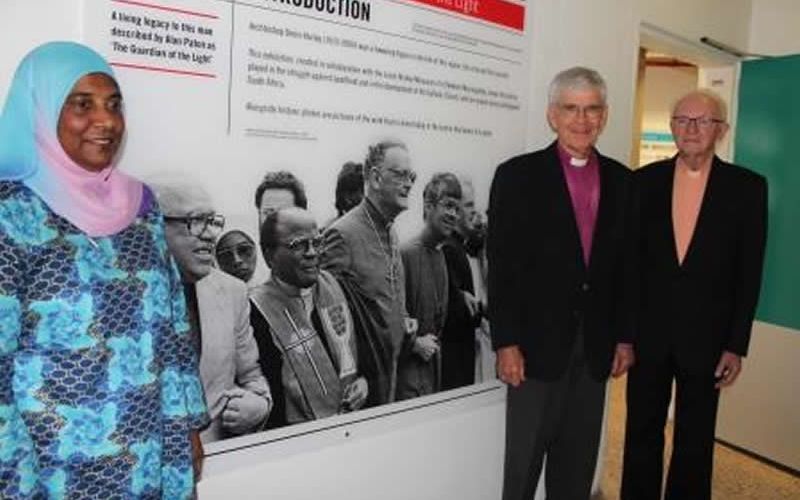
At the official opening of the exhibition, three figures from this iconic 1989 photo were reunited with their younger selves: Saydoon Sayed, Bishop Michael (right of Hurley) and Rev John Borman (to his right). (Photo: Illa Thompson).
Denis Hurley exhibition opened
[with acknowledgement to news@denishurleycentre.org]
During the recent Hurley Weekend, the permanent exhibition on the life and mission of Archbishop Hurley on the 1st floor of the Denis Hurley Centre was officially opened. The decision of Durban Local History Museums to fund the exhibition, and the presence of so many local dignitaries at the opening, prove what a key figure Hurley was in the history of the city.
Rt Rev Michael Nuttall, former Anglican Bishop of Natal, recalled the day of the Freedom March. “The faces in the photograph show the mix of hope and fear that was in our hearts that day.”
Hon Dr Zweli Mkhize, former Premier of KZN, shared his memories of how Hurley had nurtured him and so many other young Struggle leaders. “We need religious people again today to help mould leaders of character for South Africa”, he said. Prayers were shared from the Muslim, Hindu and Methodist traditions, and wonderful music provided by the choir of Assumption Catholic Church, Umbilo.
The Mass on Saturday evening was presided over by Cardinal Napier who encouraged public devotions such as the candlelight procession to Hurley’s grave that followed the Mass.
“This is just the sort of evidence that the Archdiocese needs to start the cause for the canonisation of the late Archbishop.” Such a process takes many years but could result in Hurley being declared by the Vatican, ‘Blessed Denis’ and in time ‘Saint Denis of Durban’.
At the Denis Hurley Centre AGM on 11 February, the Director, Raymond Perrier, shared some achievements of 2016:
- 82 000 meals served
- 30 000 healthcare consultations given
- 3 700 forms of assistance to refugees
- 2 300 volunteering sessions (equivalent to R135,000 of free labour!)
He considered the work of the DHC through the lens of the 1967 document of Bl. Pope Paul VI ‘Populorum Progressio’ which looks at ‘the complete development of each human’.
“The challenge today is the same as 50 years ago,” Perrier said. “How do we work together ‘in mutual understanding & friendship, in sacred communion, to begin to build the common future of the human race’?”

